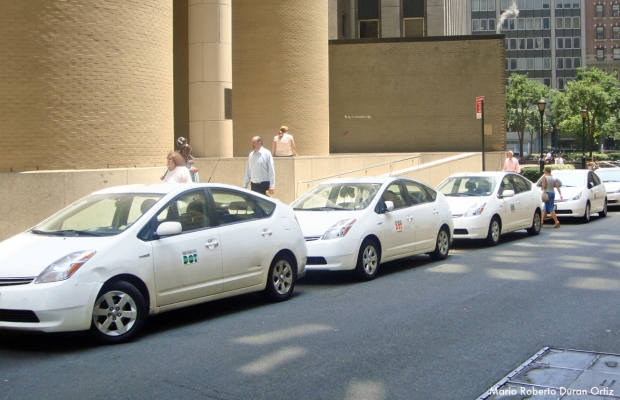Research shows electric vehicles can make sense as fleet cars

Fleet managers can benefit from buying electric vehicles under certain conditions, according to a research paper by Portland State University associate professor Miguel Figliozzi. The paper marks OTREC’s first electric vehicle-related research accepted for publication in a peer-reviewed journal.
In the paper, set for publication in the Transportation Research Record, Figliozzi presents a vehicle replacement model that compares the benefits of conventional and electric vehicles under various scenarios. Incorporating electric vehicles makes the most sense for heavily used fleets when gasoline prices are high, assuming electric vehicle tax credits continue.
Until their purchase price drops, electric vehicles won’t make financial sense for fleet managers without some incentives. “Tax credits are important, especially at the beginning, given the higher price of EVs,” Figliozzi said. “The federal tax credit is roughly 20 percent of the (Nissan) Leaf’s list price and it makes a difference.”
The model presented in the paper shows that fleets will start to include a few electric vehicles with gas at $4.10 per gallon, assuming the existing tax credits. In heavily used fleets, defined as 19,000 miles per year per vehicle, the number of electric vehicles jumps to 64.3 percent of the fleet.
E ven if cases where electric vehicles don’t make economic sense, fleet managers will buy more fuel-efficient conventional cars if gas prices rise or if they put a lot of miles on their cars. In either scenario, fleet miles per gallon rises 2.8 percent. With both high gas prices and heavy vehicle use, fleet mileage improves 3.9 percent.
ven if cases where electric vehicles don’t make economic sense, fleet managers will buy more fuel-efficient conventional cars if gas prices rise or if they put a lot of miles on their cars. In either scenario, fleet miles per gallon rises 2.8 percent. With both high gas prices and heavy vehicle use, fleet mileage improves 3.9 percent.
Adding an electric vehicle tax credit to those factors improves the fleet miles per gallon 71.8 percent.
Figliozzi examined vehicle fleets because fleet managers’ decisions can be described more rationally than those of individual consumers, he said. Whereas individual consumers might buy a particular car for reasons such as supporting green ideas or products, fleet managers must consider economics first.
Fleet managers can use this research to consider the many factors that combine to affect the best purchase decision. Figliozzi said. “There are scenarios where EVs will be the best option, but there are scenarios where they are not,” he said.
 “I would hedge and spread out the options depending on how you use the vehicles” he said. “Have some EVs and use them if you do a lot of miles. Otherwise, use more of the conventional or hybrid vehicles.”
“I would hedge and spread out the options depending on how you use the vehicles” he said. “Have some EVs and use them if you do a lot of miles. Otherwise, use more of the conventional or hybrid vehicles.”
Although the United States doesn’t impose a tax on greenhouse gas emissions, Figliozzi considered the European Union’s cap-and-trade value of $18.7 per ton. At that cost, considered much lower than the true cost of carbon emissions by some economists, an emissions tax had no effect on the decision to purchase electric vehicles.
The paper is titled “Economic and Environmental Optimization of Vehicle Fleets: A Case Study of the Impacts of Policy, Market, Utilization and Technological Factors. Portland State graduate students Jesse Boudart and Wei Feng are co-authors. A version of the paper was presented at the Transportation Research Board’s annual meeting in January.
The research grew out of the OTREC project “Green and Economic Fleet Replacement Modeling.” Figliozzi will follow up this research with a paper this spring that details the break-even points for various vehicle types given fluctuations in gasoline prices and other economic and technological factors.
Click here to read the full paper.
